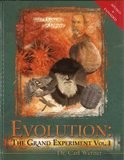Science and the Inquisition
Can scientists be unbiased? What are the limits of science? And were earlier scientists simply cowed into creationism by the Inquisition? Roger Patterson, AiG–U.S., examines this and more.
Re: What Is Science?
You say: The idea that science cannot accept a creationist perspective is a denial of scientific history. Do not confuse science and scientists. Thanks to the Inquisition, the scientists you cite had only the creationist perspective available. Consider the Italian monk who was burned for speculating that God may have created life on other worlds. You mention Galileo was a creationist the Inquisition made sure he was.
You say: Evolution denies the role of God in the universe. Actually, only the biblical role is denied, or there couldnt be such a thing as theistic evolution. Similarly, a Hindu would deny your version of creation but not the role of the Gods in creation.
You say: If an idea is not testable, repeatable, observable, and falsifiable, it is not considered scientific. Specifically, it is an idea that can not be answered by operational science. If this limits the questions that science can address, so be it.
L.W., U.S.
Atheists in Church
Ken
I had to smile at your story of the man you yelled out at you while you were speaking. I was not happy that he interrupted your talk (as a speaker that can disrupt your “flow”) but . . . I couldn’t help but think . . . you are one of very few Christians who can draw atheists into church!! WOW!! Just getting them through the doors-I’m praising the Lord because of it. Keep it up Ken! May the Lord protect you, your family and staff-mind, body and spirit. May you have the spirit of David before Goliath-“you come against me with ‘clever arguements and worldly philosophies’ but I COME AGAINST YOU IN THE NAME OF THE GOD OF ISRAEL!!” Whoo hoo!
—C.K., U.S.
Have Something to Add?
Let us know what you think.
First, I noticed by your email address that you are serving in our military. Let me thank you for your service to our country. Our very ability to have this type of a discussion in a public forum and for me to publish books is due to the sacrifice that men and women like you have made. I truly appreciate your service.
I would like to consider each of the three points you mention separately and try to line them up with the truth of Scripture. Please know that I say the following things in love and hope that you will consider them sincerely.
You say: The idea that science cannot accept a creationist perspective is a denial of scientific history. Do not confuse science and scientists. Thanks to the Inquisition, the scientists you cite had only the creationist perspective available. Consider the Italian monk who was burned for speculating that God may have created life on other worlds. You mention Galileo was a creationist the Inquisition made sure he was.
I do believe that claim can be substantiated, though there seems to be much revision of history recently. When you mention the idea of not confusing science and scientists, I think you are missing an important point. There is a myth in our modern world that modern scientists are unbiased in their approach to understanding the world. This is accompanied by the myth that the facts speak for themselves and give undeniable conclusions. The problem is that, in fact, scientists do have beliefs about the world and all facts must be interpreted.
How scientists come to their conclusions is determined by their views concerning the nature and purpose of science. If a scientist believes that no supernatural influences exist in the universe, then they will reject any such explanations when they interpret the evidence. This will not likely come into play in generating the data and the operational science in the lab, but it is more likely to influence the explanation of the data.
Take the amino acid sequence in proteins. Developing the techniques to measure the protein sequence and analyzing them to determine the sequence is generating facts. We can know the sequence of the protein and compare it to the sequences of other proteins. These things can be done objectively.
When we start to explain how to apply those facts to our understanding of the world, bias enters the picture. A scientist who is committed to the view that biological evolution gradually produced all living things will interpret the protein sequence in a way that supports his ideas—that all life evolved from a common ancestor. A scientist who believes that God created all kinds of living things at some distinct point in the past will use the protein sequence to support his ideas—that life has a common Designer.
The fact that there were certain people using their religious views, views that are contrary to the teachings of Scripture, to influence society is a bit irrelevant to the discussion. I could make the same counterclaim about the naturalistic inquisition going on in universities and other institutions in the U.S. today (see the movie Expelled or the recent book Slaughter of the Dissidents for documentation of this claim). The men I mention in the book you are referring to (Evolution Exposed), several of whom had no connection to an inquisition, used their faith in God to understand the world around them. The ability to conduct reproducible experiments is ultimately founded on the idea that God has established a universe that primarily operates on the consistent laws of nature (see “God & Natural Law” for an explanation of this idea). The existence of God makes scientific inquiry possible!
You say: Evolution denies the role of God in the universe. Actually, only the biblical role is denied, or there couldnt be such a thing as theistic evolution. Similarly, a Hindu would deny your version of creation but not the role of the Gods in creation.
I absolutely agree with your conclusion. The only view of origins in which some form of evolution is inconsistent is the clear teaching from the Bible—specifically the first chapters of Genesis. Those who claim that Genesis is simply an allegory that communicates moral ideas and generalizations, not the true account of creation, can squeeze evolutionary ideas into the Bible. If the Genesis text is not a literal account of how God created the universe, then evolution could be true. The problem is that the Genesis account does present the true account of how God, who cannot lie, created. (If you would like more details about why the text should be viewed as an actual historical account, please see “Could God Really Have Created Everything in Six Days?”).
In the book of Colossians, Paul warns Christians to avoid philosophies form the world:
Beware lest anyone cheat you through philosophy and empty deceit, according to the tradition of men, according to the basic principles of the world, and not according to Christ. (Colossians 2:8)
As a Christian, I reject the ideas of evolution, whether biological, cosmological, or geological, because they do not line up with the clear teaching of Scripture. These ideas are philosophies based on the principles of the world and not according to the clear teaching of Christ through the Bible. I am not anti-scientific; I love trying to understand how God works in the world, but I make sure that Scripture is my absolute authority and that all of my thinking lines up with it. Without a standard, how can we ever know which explanations are correct?
Those who claim that the Bible is compatible with evolution are being inconsistent in their thinking.
Those who claim that the Bible is compatible with evolution are being inconsistent in their thinking. They claim that radiometric dating has proven the earth is billions of years old; so, Genesis 1 cannot be referring to six literal days in which God created the earth. They claim that our modern understanding of science makes it impossible to accept the biblical age of the earth—roughly 6,000 years old—a global Flood, people who lived past 900, etc.
But they claim to have no such qualms about being saved from God’s wrath by the sacrifice of Christ on the Cross, who rose from the dead and was born of a virgin. They conveniently forget that modern science makes it impossible to accept that a virgin can conceive or that a dead man can rise from the dead! They pick and choose those ideas that are comfortable for them, not realizing that they are being inconsistent in their thinking. In essence they are raising their own ideas above God’s and choosing what they want to trust in God’s Word. So, who is really the authority in such a view?
You say: If an idea is not testable, repeatable, observable, and falsifiable, it is not considered scientific. Specifically, it is an idea that can not be answered by operational science. If this limits the questions that science can address, so be it.
It seems that this closing statement refutes the rest of your disagreements. If science were limited to only those things that are testable, repeatable, observable, and falsifiable, then evolution would not be considered a scientific idea. One kind of organism changing into another over millions of years is not observable (it happened in the past); it cannot be repeated or tested; and it is not falsifiable (since it can’t be repeated). So, if it is not based on operational science, then it is based on a belief. Therefore, we need to shift our discussion to the validity of our belief systems.
You seem to have realized that this is not about science, but about beliefs. Our underlying beliefs influence the way that we view the world. Because I see the world and myself as a creation of God, I recognize that I am responsible to Him for all of my actions and thoughts. Romans 1:19–21 informs me that everyone looks at the world and recognizes the existence of a Creator. The question is whether we accept or reject His rightful role in our lives.
The same book that describes the origin of the universe, Genesis, describes the origin of the separation between God and man. Sin entered the world, and because we sin by breaking God’s laws, we are subject to God’s punishment. However, God also provided a way to heal that separation. Christ died on the Cross to pay the penalty that we should rightly pay for those sins. Because I have repented and put my trust in Christ, I know that my sins are forgiven and my eternal destination is secure.
Do you have that assurance? Have you trusted what the Bible says about God? What you do with God’s offer of salvation has eternal significance.
Sincerely,
Roger Patterson
Recommended Resources

Answers in Genesis is an apologetics ministry, dedicated to helping Christians defend their faith and proclaim the good news of Jesus Christ.
- Customer Service 800.778.3390
- Available Monday–Friday | 9 AM–5 PM ET
- © 2026 Answers in Genesis







